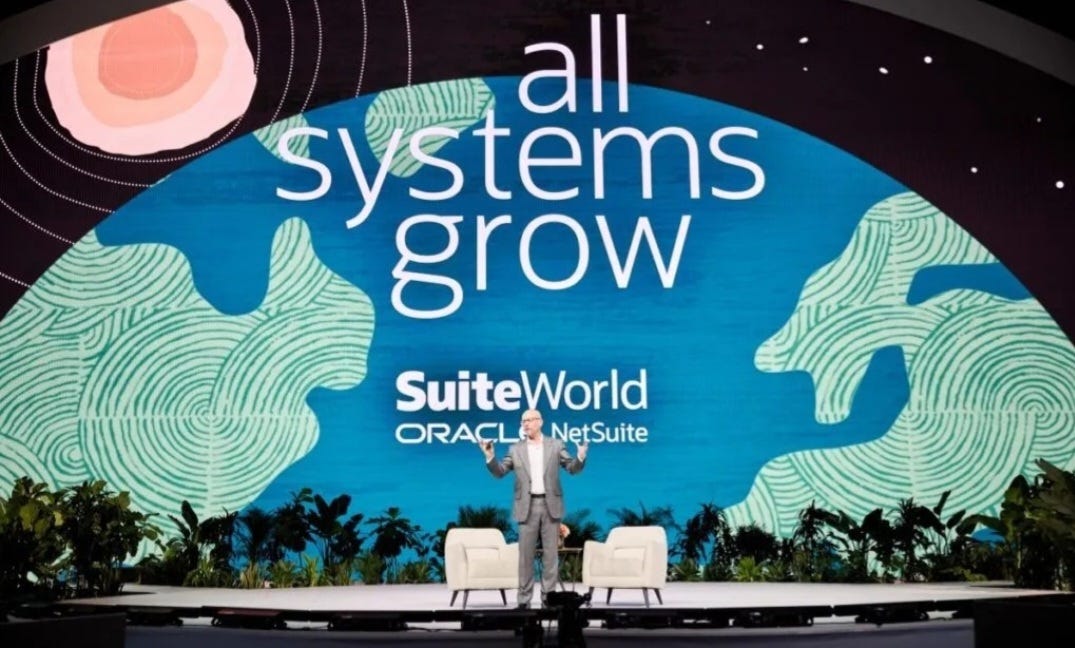NetSuite’s AI Push: More Evolution Than Revolution

NetSuite unveiled its latest AI enhancements at SuiteWorld in Las Vegas this week, as one of the companies at the forefront of the industry-wide push to integrate artificial intelligence into business software. However, the company’s approach suggests more of a measured evolution than a dramatic overhaul of existing offerings.
From financial sleuthing to natural language analytics, NetSuite’s AI push aims to boost productivity without overwhelming its core mid-market clientele. But in a field where everyone’s shouting “AI,” will NetSuite’s quieter integration strategy cut through the noise?
AI’s Quiet Evolution in NetSuite’s Ecosystem
The new features, while potentially useful, aren’t groundbreaking in the broader ERP landscape:
- Financial Exception Management aims to spot anomalies in financial data.
- SuiteAnalytics Assistant offers natural language querying for reports.
- Prompt Studio allows customization of AI-generated content.
The Generative AI for SuiteScript API might have the most long-term impact, enabling developers to integrate AI into custom extensions. Paired with the AI-powered coding assistant, this could lead to more AI-enhanced apps within NetSuite’s ecosystem.
Probably the most notable thing here is the integration approach itself. There’s no standalone AI module but rather these features are woven into existing tools. This could be appealing to companies hesitant about complex AI integrations. But it also raises other questions, such as whether users might not always notice the actual enhancements. And in a market where some companies are less subtle, will NetSuite stay as relevant as it might?
The real test will be in whether these features deliver practical value that helps businesses dealing with real-world challenges.
More Than Just AI: NetSuite’s Broader Play
While AI grabbed the headlines, NetSuite’s other announcements hint at a more comprehensive strategy. SuiteProcurement, a new offering, tackles the often-overlooked indirect spend category. This pragmatic addition addresses a common pain point for companies that want to tighten financial control and optimize expenses.
The NetSuite Connector for Salesforce is also significant. It bridges the gap for companies using both platforms, and it meets the longtime challenge of ERP-CRM integration. This move reflects NetSuite’s recognition of the diverse, multi-vendor IT landscapes many businesses operate within.

Updates to Enterprise Performance Management and Analytics Warehouse suggest NetSuite isn’t neglecting its core competencies. These enhancements, focused on improving data analysis and financial planning, align with the company’s bread-and-butter: providing actionable insights for finance teams.
These moves paint a picture of a company balancing innovation with practicality. NetSuite seems intent on shoring up its foundations while cautiously exploring new territories. This should be enough to fend off both legacy competitors and upstart cloud-native challengers.
Market Ripples and Adoption Hurdles
NetSuite’s measured AI approach could help reshape the mid-market ERP landscape, where flashy AI promises often clash with practical implementation concerns. Embedding AI into existing workflows stands to resonate with businesses wary of disruptive overhauls.
However, as I mentioned, it’s subtle in some ways, and that comes with concerns:
- Since it’s become such a part of the basic workflow, it’s almost taken for granted
- Risk of underutilization on the part of some users
- Potential for overlooked value
Compared to competitors like SAP and Microsoft, who’ve made splashier AI announcements, NetSuite’s strategy feels almost understated at times.
Regardless, the real challenges lie in adoption and differentiation. Many companies lack the data science expertise to fully leverage AI capabilities. So, NetSuite’s integration-first approach can mitigate this, but it also raises questions about depth of functionality.
Opportunities for NetSuite include:
- Positioning as the “practical AI” solution for medium-sized businesses.
- Leveraging its vast customer data to train even more effective AI models.
- Developing industry-specific AI solutions to outflank generalist competitors.
The coming months will be crucial. As early adopters begin to use these AI features, their experiences will likely shape the narrative around NetSuite’s AI strategy. The company’s ability to demonstrate tangible business value, beyond AI buzzwords, will be key to maintaining its position in an increasingly AI-saturated market.
The Road Ahead: NetSuite’s AI Trajectory
As the dust settles on these announcements, the question becomes: what’s next? NetSuite’s AI integration suggests a future of incremental enhancements rather than radical overhauls. We might see more domain-specific AI applications tailored to industries like manufacturing or healthcare, leveraging NetSuite’s vast troves of sector-specific data.
The broader ERP market could feel the ripple effects. NetSuite’s approach might pressure competitors to focus on practical AI applications over headline-grabbing features. This could spark a trend towards “invisible AI” — deeply integrated but not touted so heavily.
However, the rapid pace of AI development poses challenges. NetSuite will need to balance its measured approach with the need to stay current. There’s may even be the risk of falling behind more agile, AI-native upstarts that could disrupt the ERP paradigm.
Ultimately, NetSuite’s AI journey may redefine what “innovation” means in the ERP space.
Beyond the Hype: NetSuite’s AI Reality Check
NetSuite’s AI play is a high-stakes balancing act. By weaving AI into its core offerings, the company is betting on substance over spectacle. This strategy could redefine AI’s role in ERP, shifting focus from flashy features to tangible business outcomes. Yet, in a market hungry for AI breakthroughs, NetSuite’s understated approach risks being overshadowed. The true test will be whether this pragmatic integration can deliver the transformative impact businesses crave without the disruption they fear.
Thanks for reading! Do you want to create thought leadership articles like the one above? If you struggle to translate your ideas into content that will help build credibility and influence others, sign up to get John’s latest online course “Writing From Your Voice” here.



